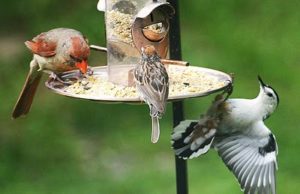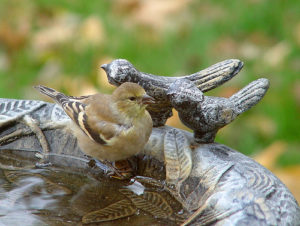
Keeping our Wildbirds Healthy
Feeding is a great way to enjoy birds in our yards. And many times, especially in winter, our bird feeders provide extra nourishment that birds might not be able to get from natural, wild sources. But it’s important to make sure we are helping the birds rather than hindering them or creating unhealthy conditions. So here are a few tips to make sure our wild birds stay healthy all year long.
First and foremost, keep your feeders clean. Droppings, debris and old seed that has gone moldy can create conditions that spread sickness and diseases among birds. Clean your feeders well at least once a month—more often if they obviously appear dirty. First, scrub the feeder well. If there is caked-in seed that you can’t get loose, soaking the feeder in a bucket of warm water for a period of time will help loosen it up. If you have a tube feeder that has hard-to-reach areas, a feeder cleaning brush will help. You can also use a soy-based feeder cleaner made to be safe for birds. If you want to thoroughly disinfect your feeders, you can do it by using one part chlorine bleach (or vinegar) to 9 parts of water and submerging them for several minutes. If you can’t submerge the feeder, spraying it with the same solution will accomplish the task. Let feeders air-dry before refilling them.
Hummingbird and oriole feeders can be particularly hard to clean because the sugar water can develop harmful mold. To remove it, there are new enzyme based cleaners that will dissolve organic debris. Using a special nectar feeding brush set will also help do the job.
 If you have a lot of birds, give them enough bird feeders so they aren’t fighting for food—and don’t crowd your feeders too close together. Crowded conditions spread diseases faster. And if birds are fighting or jostling for space it creates stress which drains the energy that they need for more important activities, such as foraging and nesting.
If you have a lot of birds, give them enough bird feeders so they aren’t fighting for food—and don’t crowd your feeders too close together. Crowded conditions spread diseases faster. And if birds are fighting or jostling for space it creates stress which drains the energy that they need for more important activities, such as foraging and nesting.
Keep the area under the feeders clear of seed debris and droppings. Rake or sweep the area clean, or even use a shop-vac if you have one.
If food is stored for over a few months, especially in hot weather, the oils could possibly go rancid or attract insects. For long term storage, you can freeze seed and suet in its original packaging. And keep seed safe from rodents: that can also spread bird diseases. A container made for seed storage will keep seed fresh.
 It’s also important to keep your bird baths free from algae, droppings and debris. A good practice is to change the water once a week, rather than continuously topping it off. Scrub the bath well with a scrubbing brush, then rinse it well several times before refilling. Algae can be prevented with a capful Bird Bath Protector, an enzyme solution that is safe for all birds and animals.
It’s also important to keep your bird baths free from algae, droppings and debris. A good practice is to change the water once a week, rather than continuously topping it off. Scrub the bath well with a scrubbing brush, then rinse it well several times before refilling. Algae can be prevented with a capful Bird Bath Protector, an enzyme solution that is safe for all birds and animals.
Finally, visually check the feeder areas frequently so you can correct any problems with cleanliness or with damaged feeders that may cause injury. With just a few precautions and common sense, we can make sure that the birds we invite into our yards remain healthy and happy.